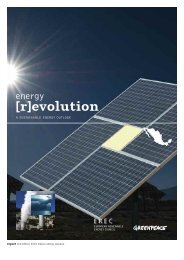download the turkey energy revolution scenario
download the turkey energy revolution scenario
download the turkey energy revolution scenario
Create successful ePaper yourself
Turn your PDF publications into a flip-book with our unique Google optimized e-Paper software.
Impacts of climate change are diverse and serious, and unless <strong>the</strong><br />
emissions of GHGs are effectively mitigated <strong>the</strong>se would threaten to<br />
become far more serious over time. There is now, <strong>the</strong>refore, a renewed<br />
interest in renewable sources of <strong>energy</strong>, because by creating and using<br />
low carbon substitutes to fossil fuels, we may be able to reduce emissions<br />
of GHGs significantly while at <strong>the</strong> same time ensuring economic growth<br />
and development and <strong>the</strong> enhancement of human welfare across <strong>the</strong><br />
world. As it happens, <strong>the</strong>re are major disparities in <strong>the</strong> levels of<br />
consumption of <strong>energy</strong> across <strong>the</strong> world, with some countries using large<br />
quantities per capita and o<strong>the</strong>rs being deprived of any sources of modern<br />
<strong>energy</strong> forms. Solutions in <strong>the</strong> future would, <strong>the</strong>refore, also have to come<br />
to grips with <strong>the</strong> reality of lack of access to modern forms of <strong>energy</strong> for<br />
hundreds of millions of people. For instance, <strong>the</strong>re are 1.6 billion people<br />
in <strong>the</strong> world who have no access to electricity. Households, in which <strong>the</strong>se<br />
people reside, <strong>the</strong>refore, lack a single electric bulb for lighting purposes,<br />
and whatever substitutes <strong>the</strong>y use provide inadequate lighting and<br />
environmental pollution, since <strong>the</strong>se include inefficient lighting devices<br />
using various types of oil or <strong>the</strong> burning of candles.<br />
Future policies can be guided by <strong>the</strong> consideration of different<br />
<strong>scenario</strong>s that can be linked to specific developments. This publication<br />
advocates <strong>the</strong> need for something in <strong>the</strong> nature of an <strong>energy</strong><br />
<strong>revolution</strong>. This is a view that is now shared by several people across<br />
<strong>the</strong> world, and it is also expected that <strong>energy</strong> plans would be based on<br />
a clear assessment of specific <strong>scenario</strong>s related to clearly identified<br />
policy initiatives and technological developments. This edition of<br />
Energy [R]evolution <strong>scenario</strong>s provides a detailed analysis of <strong>the</strong><br />
<strong>energy</strong> efficiency potential and choices in <strong>the</strong> transport sector. The<br />
material presented in this publication provides a useful basis for<br />
considering specific policies and developments that would be of value<br />
not only to <strong>the</strong> world but for different countries as <strong>the</strong>y attempt to<br />
meet <strong>the</strong> global challenge confronting <strong>the</strong>m. The work carried out in<br />
<strong>the</strong> following pages is comprehensive and rigorous, and even those<br />
who may not agree with <strong>the</strong> analysis presented would, perhaps, benefit<br />
from a deep study of <strong>the</strong> underlying assumptions that are linked with<br />
specific <strong>energy</strong> <strong>scenario</strong>s for <strong>the</strong> future.<br />
Dr. R. K. Pachauri<br />
DIRECTOR-GENERAL, THE ENERGY AND RESOURCES<br />
INSTITUTE (TERI) AND CHAIRMAN, INTERGOVERNMENTAL<br />
PANEL ON CLIMATE CHANGE (IPCC)<br />
OCTOBER 2008<br />
© GREENPEACE/FLAVIO CANNALONGA<br />
7<br />
8<br />
policy<br />
recommendations 39<br />
glossary & appendix 45<br />
Greenpeace International, European Renewable Energy Council (EREC)<br />
date August 2009. EREC Christine Lins, Arthouros Zervos. Greenpeace Mediterranean Hilal Atici.<br />
Greenpeace International Sven Teske, Project Manager. authors Sven Teske, Hilal Atici. editor Crispin Aubrey.<br />
research DLR, Institute of Technical Thermodynamics, Department of Systems Analysis and Technology Assessment,<br />
Stuttgart, Germany: Dr. Wolfram Krewitt, Dr. Sonja Simon, Dr. Thomas Pregger. Ecofys BV, Utrecht, The Ne<strong>the</strong>rlands:<br />
Wina Graus, Eliane Blomen. design & layout Jens Christiansen, Tania Dunster, www.onehemisphere.se<br />
contact EREC Christine Lins: lins@erec.org Greenpeace Mediterranean: Hilal Atici, hilal.atici@.greenpeace.org<br />
Greenpeace International: Sven Teske; sven.teske@greenpeace.org for fur<strong>the</strong>r information about <strong>the</strong> global, regional<br />
and national <strong>scenario</strong>s please visit <strong>the</strong> <strong>energy</strong> [r]evolution website: www.<strong>energy</strong>blueprint.info/ Published by Greenpeace<br />
International. Printed on 100% post consumer recycled chlorine-free paper.<br />
3


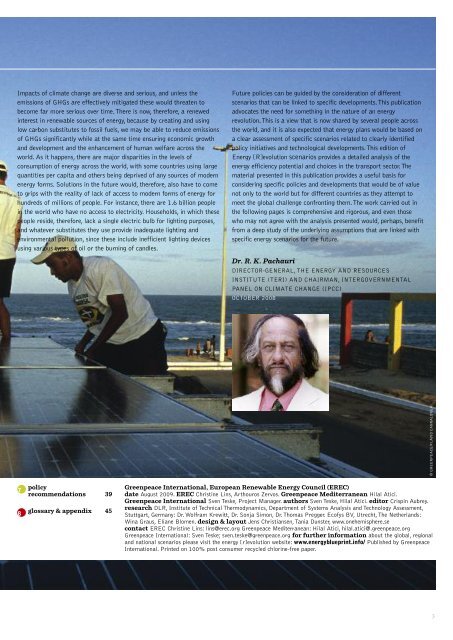
![Energy [R]evolution - European Commission](https://img.yumpu.com/49109324/1/184x260/energy-revolution-european-commission.jpg?quality=85)
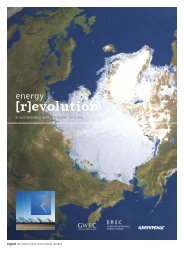
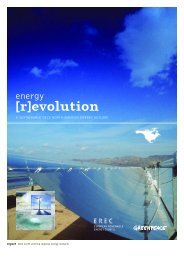
![5905 gp [eu rev]csfr4.qxd - Energy [R]evolution](https://img.yumpu.com/42305023/1/184x260/5905-gp-eu-revcsfr4qxd-energy-revolution.jpg?quality=85)
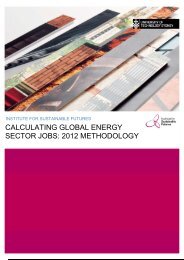
![5905 gp [eu rev]csfr4.qxd - Energy [R]evolution](https://img.yumpu.com/28729264/1/184x260/5905-gp-eu-revcsfr4qxd-energy-revolution.jpg?quality=85)
